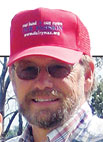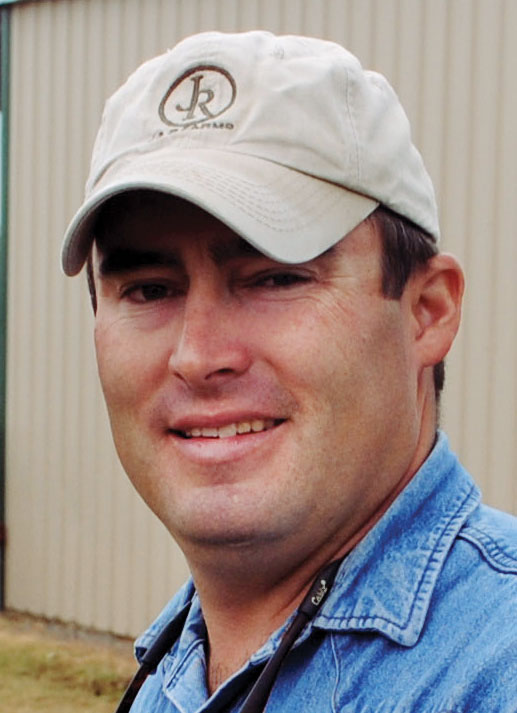 Marsha Hedge, who owns 300 acres in the rural Fayetteville, Ark., area, is a perfect picture of what determination and courage can do for someone owning and operating a farm alone.
Marsha Hedge, who owns 300 acres in the rural Fayetteville, Ark., area, is a perfect picture of what determination and courage can do for someone owning and operating a farm alone.
When questioned if gender was a factor, Marsha said, “I have mostly worked in male-dominated fields and have built a reputation and developed confidence so that I face no ‘little lady’ issues.”
Marsha and her veterinarian husband Dennis purchased 100 acres in 1993, starting with 11 cows. They added some land and began building a strong commercial herd, constantly experimenting with breeds and combinations. Then in 1999, while riding a four-wheeler near their home, Dennis was killed in a hit and run accident.
“I was really angry and decided to never let whoever ran my husband off the road see this farm go under,” Marsha said. “My husband was a perfectionist and kept everything perfectly neat and tidy. The hardest lesson I had to learn was to make priorities and adjust them as needed because keeping the farm perfect by myself is simply impossible.”
Since 1999, Marsha doubled the acreage, and at one time had 129 mommas. She sold down to 40 because of three very dry summers when hay became unaffordable. Keeping the farm afloat has been and continues to be a challenge.
“I can’t say enough good things about Farm Credit Service and the Washington County Extension Agency,” Marsha said. “I have had and continue to have loans with FCS, especially in conjunction with conservation programs such as cross fencing and rotational grazing, which were suggested by the extension agency.”
Marsha admits that from the beginning she knew she didn’t have all the answers and feels blessed to be surrounded by willing and helpful people. She was especially appreciative in 2002 when she survived both breast cancer and a devastating car wreck that made her “pretty much a bionic woman,” full of screws and metal plates and other medical adaptations.
Marsha recently started rebuilding her herd and now has 46 mommas, plus five bred heifers and eight more to be bred next year. She never buys cows or heifers, using her own heifers as replacements, making the herd closed. Bulls are brought in for new bloodlines and she isolates them before allowing them access to the herd. She buys her purebred Simmental bulls from Jeremy Blankenship, who is the ranch foreman for Dr. Dwayne Thomas, an old and trusted friend. Both ensure that the bloodlines are far enough removed to produce strong and healthy calves.
The Hedges began with Charolais bulls and have also used Limousin, Santa Gertrudis and Black Angus.
“I know they say black sells, but Angus are too weak in the high-end for what I am looking for,” Marsha explained. “I prefer the broader and more muscled carcass of a Limousin/Simmental cross. We had a really good black Simmental bull for eight years and kept all of his heifers. Most of my cows come from that bloodline. Limousin is a good breed and produces good strong calves but not enough milk for optimum calf growth. I find the Limousin/Simmental cross works best for me and I like red.”
During spring and summer, the herd is grass fed, though Marsha supplies loose mineral with changing components according to season and need.
“I sometimes put out blocks for the cows to play with, and I find them kicked all over the place,” shes said with a laugh.
During severe winter weather, Marsha uses baked proteins tubs and will occasionally buy a load of 14 to 16 percent pelleted grain.
“I work the cattle twice a year,” she said. “They receive one round of vaccinations and are wormed twice. Marsha uses different wormers at different times to prevent resistance and uses both injectable and pour on.”
Water is an issue for the farm. While she has no documented proof, she has observed that when everyone in the area is getting rain, the ridge on which she lives frequently receives none. However, last year was a good year for rain, and Marsha baled 450 large bales by herself. She sets aside 60 acres for hay, which she fertilizes, preferably with chicken litter when she can afford it, and she rigorously attacks weeds. Because of rotational grazing every three to five days, fertilization of pasture areas is not as necessary, more sporadic and according to cash flow.
The land near Marsha’s farm makes a perfect rookery for an aggressive breed of buzzard from Mexico and South America. The birds are darker and shorter than the typical Arkansas buzzard, but stockier and highly aggressive. They follow and harass herds as they move from pasture to pasture, always circling and looking for an opportunity. The history of this bird is well documented and, like so many other farmers in the southern part of the United States, Marsha has lost both calves and cows to these dangerous predators. The birds are not afraid of humans and congregate in flocks of 50 or more on Marsha’s land. Marsha is still searching for solutions. Because she has taught school for the last three years to increase cash flow to keep the farm financially viable, Marsha is not home enough to keep as close a watch a she would like.
“I love my farm and what it helps teach my grandchildren: perseverance and responsibility,” Marsha said. “They love coming here and doing whatever it is I am doing. We (recently) started with baking a tie-dyed cake and then fixed fence.”







